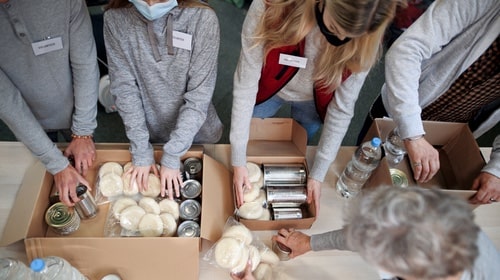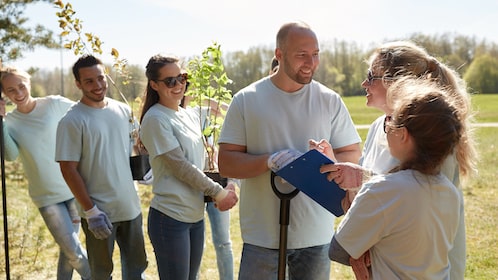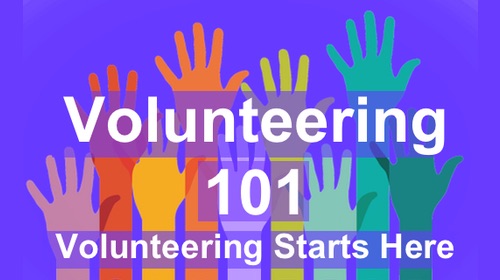Develop Your Grants Calendar
Don’t wait for funding announcements. Learn how to develop a handy grants calendar and save stress by planning ahead.
Authored by: iClick2Learn Team
Translate Text
– Hello, this is Karen Saunders with the interview with an expert series. And I have with me Natalie Bramble. And we’re going to talk about “Grants Calendars”. I say grant you say grant.
– Tomato, tomato.
– Yeah, yeah, yeah so if I say it little differently, it’s the same thing.
– Now, “Grants Calendars”, what are they? Yeah
– Yeah!
– It’s not “Grants Calendar”, it is something completely different.
– So, what is a “Grants Calendar”?
– Yeah, that’s what I want to know.
– Or “Grants” Calendar.
– Yeah.
– Um, yes so you probably heard it term and thought, okay what is that, what do I do, how does that even work? Essentially, we have a period of time in the year where it’s… I call it hunting season. For money, hunting for money. So hunting season opens, and when does hunting season close? And what grants are there available?
– Oh.
– So this is a little bit of planning.
– Oh okay.
– Yes.
– So this is, not a calendar that’s actually out there at the moment. This is something you’d create yourself.
– Exactly, yes exactly. So, so a “Grants Calendar” basically is your 12 month plan of when the general grants that fit with your organisation that fit with your strategic plan, the strategies or your goals. When they generally come out. Because the biggest thing with grants is people don’t give enough time to the planning and the preparation. And we miss an opportunity. Cause it’s close or we didn’t know about it. Now it is a lot more difficult this day and age, with the current environment to do a “Grants Calendar”, because they’re not set in stone. You can only make assumptions, I call them “guestimations” or estimations. An estimation is based on the fact that, perhaps, Let’s peak the SidMyer foundation. So the SidMyer foundation for the last five years has been supporting a particular strain, let’s say youth, education.
– Okay
– And you can estimate based on the last five years or even the last two years that okay they’re going to support youth education. We happen to be in youth education, it’s coming out in March. Therefore I need to start thinking about this in February… really in January. Two months before hand. You’ve only got about a two to three week window these days to apply for grants. And if you’re developing a project from scratch, if you’ve got a shelf project, that’s great. If you want to know what I mean by shelf project there’s going to be some further… I’ll provide a link down below to what a shelf project is and what you should be doing. But at the end of the day you need to be planning ahead, and that’s what a “Grants Calendar” does. Now a guestimation is that you look at the SidMyer foundation and you say, well, is seems that last year they did youth, the year before they did senior, so i don’t know what they’re going to do. So I’m going to guess that yeah we need to look at them. So maybe we’re not going to be able to plan something, but we are going to guess that one of our programmes might fit with something that they’re looking at. And I mean you need to look at trends, you know, if they’ve been supporting youth for the last two years and they seem to be changing every two years, you’ve got to start saying, what do I think they might be supporting next. You know do some research, have a look at the things that they’re supporting and the things that they’re talking about, you know the media releases, etc. So a “Grants Calendar”, basically you’ve got to do your research. There’s a couple of great tools, look if you’re in New South Wales, one is “communitybuilders.nsw.gov.au” They actually tell you about the grants that are closed. So you can start doing a little bit of research on you know, well are they likely to come up again.
– Right.
– Can I assume that they might come up. Look the one I use is the our community news letter, so it’s the funding scoop. It’s the grants newsletter that comes out. It is a paid… Philanthropy Australia also has one. And they range between about, I think… I don’t really pay for our community ones, so mate… 67, I don’t know… 45, Philanthropy Australia I think is around 120, 110, 120. So, and what you would do and what I do with clients, is we basically look at the last 12 months of grants and we say, okay what are the grants that feet within what their focus is or their priority or you know, there… where they deliver their outcomes, and are these likely to be grants and when do they come out? So again if we’ve got one in June, then we would say put that in the diary, in the calendar for June and then we would say, we need to start looking at and or planning for this grant, you know, two months before. So in April.
– Yeah.
– So that’s a “Grants Calendar”
– That is it
– It’s about forward planning and being proactive rather than reactive.
– Yes, that’s great. So just a question on identifying… So you’ve given us a couple of ideas of places to go, there’s obviously quite a bit of pre-work, once you’ve identi… once you’ve got a list of all the grants, to know which ones are relevant for you. So is that the sort of thing you’d set quite a bit of time to do initially and keep a bit of a log of which organisations are most likely to suite you or…
– Yeah, yeah, yeah, you see.,.
– Call it your data base.
– That’s right and you need to build a… you know, spend a couple of days. You know five, six hours doing it, to build your “Grants Calendar”, but you certainly… You know, you need to actually look at, okay… You need to look at the organisation and then as I said you need to look at what they’re supporting and whether that actually fits or aligns. I mean you could just have a “Grants Calendar” with every single grant that is being provided. You know, every single agencies name. But at the end of the day, if they’re not supporting what, or you’re not eligible. So a foundation… SidMyer foundation, they look at organisations that have deductible gift recipients status. Well if you don’t have deductible gift recipients status, they’re not going to go on the calendar. So you’ve got to do a little bit of that before hand to see and to basically access whether it’s worth while putting it on your calendar. Some might be a long shot, but it might be worth while putting it on there.
– Cause you just don’t know whether they’re going to come up with something…
– Yeah.
– That might then fall right in the area that you’re looking at. And things go through trend, they cycle through…
– Yeah
– To some of the organisations do like… they’ll pick up a particular theme one year and then it becomes something different, so…
– Yeah and there’s three ways that you can be really, really proactive with knowing what grants are out.
– Yes.
– We’ll cover that in the next video.
– Ah, I wanted to know that now. So we’re getting to the meat of it. Okay, so we’ve got to wait for the next one.
– Yep.
– Okay.
– Well Natalie, thank you that was great I know what “Grants Calendar” looks like now. It’s got a lot of web links
– Well that’s fantastic, thank you very much I think that’s very powerful for anybody who’s looking and certainly looking for grants as a source of funding. So…
– Yeah and hey why don’t we put up a template?
– Ah why don’t we do that.
– Yeah why don’t we do that.
– Okay we’ll do a template.
– Natalie thank you very much.
– Great, so you can download that template, just, on the link below.
– Excellent.
– Great, thanks.
– Thanks.
There are predictable grant funding programs we can plan for, and there are those opportunities that surprise us. More often than not, we’re wasting time and adding stress to our roles by not planning for those funding opportunities we know are coming up. There’s enough effort put into the surprises opportunities so let’s save time and stress by organising ourselves for the planned opportunities.
A grants calendar is one handy tool you can use to help you prepare. The grants calendar also helps you to gain a valuable oversight into the workload of your team, keeps everyone on track during the process, and is a good prompt to use during meetings to identify potential funding.
Hear Natalie in the below video talking with Karen about the grants calendar; what it is and how you can use it.
So how do you create a grants calendar?
- Make sure you have a list of projects/programs you want to deliver in the next 18-24 months.
- Download the Grants Calendar Template here.
- Research available grants – you can use a variety of sources and I suggest going back 12 months to identify suitable grants.
- Document those grants that you feel align with your organisation’s purpose, or, fund similar projects and programs with your purpose.
- Sort the data in the table to show it in order of month.
- Track progress on your activity by selecting the right status type in the status column.
- Discuss at every meeting and continue to update and add funders as you go.
Related posts
Starting a Not-for-Profit
Accidental Counsellor
How to Get Volunteers More Engaged Post-Covid
What is a Volunteer Manager?
Building a Culture That Encourages Volunteers
What do Volunteers want Post-Covid?
Volunteer Interview
4 Steps to Attract Youth Volunteers
5 Tips for Keeping Volunteers
5 Tips for Recruiting Volunteers
Volunteering During COVID [Course]
Volunteering: What to Think About Before Signing up
Why Risk Training is a Great Thing for Volunteers to Have
Volunteer Supervisor
How to Stay Safe While Volunteering
So You’re a Volunteer! What now?
Volunteering 101 [Course]
Volunteer Induction [Course]
Volunteer Position Description
People who Volunteer
Volunteer Costs and Reimbursements
Creating a Positive Volunteer Culture
- Tags | Fundraising, Grants, Grants and Tenders





















